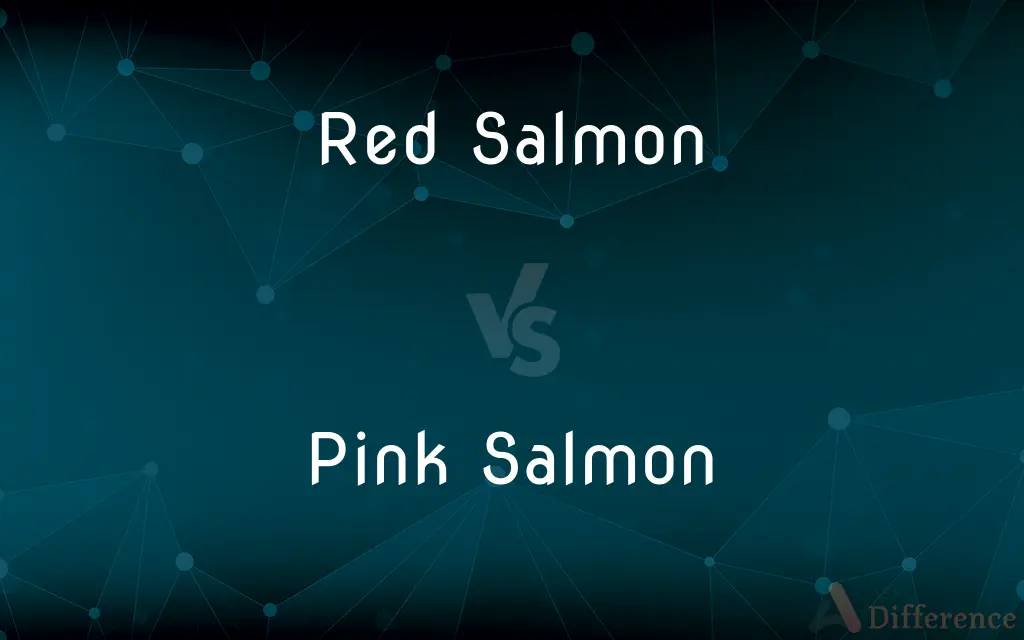Red Salmon vs. Pink Salmon — What's the Difference?
Edited by Tayyaba Rehman — By Fiza Rafique — Published on December 17, 2023
Red Salmon is richer in flavor with deep red flesh, while Pink Salmon is milder with lighter pink flesh.

Difference Between Red Salmon and Pink Salmon
Table of Contents
ADVERTISEMENT
Key Differences
Red Salmon, also known as sockeye salmon, boasts a striking deep red or orange flesh color, a feature distinguishing it from many other salmon species. On the contrary, Pink Salmon, the smallest and most abundant Pacific salmon species, has a lighter pink flesh, which can sometimes be almost pale in comparison.
In terms of taste, Red Salmon is renowned for its rich, full-bodied flavor, making it a favorite for many seafood aficionados. On the other hand, Pink Salmon offers a milder, more delicate flavor profile. This difference in taste often reflects in their prices, with Red Salmon generally commanding a higher market price than Pink Salmon.
Habitat and spawning cycles also differentiate Red Salmon and Pink Salmon. Red Salmon primarily inhabit the northern Pacific Ocean and rivers discharging into it. Their migration pattern is unique, with some swimming upstream for hundreds of miles to spawn in freshwater. Pink Salmon, however, typically spawn closer to the ocean's mouth, in shorter rivers or streams.
From a nutritional perspective, both Red Salmon and Pink Salmon are powerhouses of omega-3 fatty acids, proteins, and essential vitamins. Yet, the deeper hue of Red Salmon usually indicates a higher content of astaxanthin, a potent antioxidant. Conversely, Pink Salmon, due to its lighter flesh, tends to have a slightly lower concentration of these nutrients.
When it comes to commercial value, both Red Salmon and Pink Salmon have their significance. While Red Salmon's robust flavor makes it a premium choice for grilling and smoking, Pink Salmon, with its softer texture, is often used for canning and making salmon patties.
ADVERTISEMENT
Comparison Chart
Flesh Color
Deep red or orange
Light pink to pale
Taste
Rich, full-bodied
Milder, delicate
Habitual Range & Spawning
Northern Pacific, long migrations
Closer to ocean, shorter rivers
Nutritional Content
Higher astaxanthin
Slightly lower nutrients
Common Commercial Use
Grilling, smoking
Canning, salmon patties
Compare with Definitions
Red Salmon
A Pacific salmon with deep red flesh.
Chefs often prefer Red Salmon for its robust flavor.
Pink Salmon
The smallest Pacific salmon with light flesh.
The fisherman caught several Pink Salmon during his trip.
Red Salmon
Also known as sockeye salmon.
The fresh catch included a few stunning Red Salmon.
Pink Salmon
Spawns closer to the ocean's mouth.
Pink Salmon prefer shorter rivers for spawning.
Red Salmon
Recognized for its full-bodied taste.
The grilled Red Salmon was the star of the dinner.
Pink Salmon
Known for its milder taste.
The Pink Salmon made for a light and delicate meal.
Red Salmon
Inhabits the northern Pacific and its rivers.
The Red Salmon made its arduous journey upstream to spawn.
Pink Salmon
Often used for canning purposes.
The canned fish is usually Pink Salmon due to its softer texture.
Red Salmon
Commands a premium in seafood markets.
Due to its superior taste, Red Salmon often has a higher price.
Pink Salmon
Most abundant of Pacific salmon species.
The majority of the catch was Pink Salmon, which is quite common.
Common Curiosities
What color is Red Salmon?
Red Salmon has a deep red or orange flesh color.
Which salmon usually has a higher market price?
Red Salmon generally commands a higher market price.
Which salmon is known as sockeye?
Red Salmon is also known as sockeye salmon.
Are both salmon types nutritious?
Yes, both Red Salmon and Pink Salmon are rich in nutrients, especially omega-3 fatty acids.
Which salmon is most abundant in the Pacific?
Pink Salmon is the most abundant Pacific salmon species.
How does Pink Salmon taste compared to Red Salmon?
Pink Salmon has a milder, more delicate flavor, while Red Salmon offers a richer taste.
Where do Pink Salmon spawn?
Pink Salmon typically spawn closer to the ocean's mouth in shorter rivers.
Do both salmon species come from the Pacific?
Yes, both Red Salmon and Pink Salmon are species of the Pacific Ocean.
What's a common commercial use for Pink Salmon?
Pink Salmon is often used for canning and salmon patties.
Which salmon has a deeper hue indicating higher astaxanthin content?
Red Salmon has a deeper hue, indicating higher astaxanthin content.
How do chefs commonly prepare Red Salmon?
Chefs often grill or smoke Red Salmon due to its rich flavor.
Is Red Salmon preferred for smoking?
Yes, Red Salmon's robust flavor makes it a favorite for smoking.
Which salmon is lighter in color and flavor?
Pink Salmon is lighter both in color and flavor.
Are there any taste-based recipes specifically for Red Salmon?
Yes, due to its full-bodied taste, there are recipes tailored for Red Salmon.
Why is Pink Salmon commonly found in cans?
Pink Salmon, with its softer texture, is ideal for canning.
Share Your Discovery

Previous Comparison
Professor Zoom vs. Reverse Flash
Next Comparison
Coordinating Conjunctions vs. Subordinating ConjunctionsAuthor Spotlight
Written by
Fiza RafiqueFiza Rafique is a skilled content writer at AskDifference.com, where she meticulously refines and enhances written pieces. Drawing from her vast editorial expertise, Fiza ensures clarity, accuracy, and precision in every article. Passionate about language, she continually seeks to elevate the quality of content for readers worldwide.
Edited by
Tayyaba RehmanTayyaba Rehman is a distinguished writer, currently serving as a primary contributor to askdifference.com. As a researcher in semantics and etymology, Tayyaba's passion for the complexity of languages and their distinctions has found a perfect home on the platform. Tayyaba delves into the intricacies of language, distinguishing between commonly confused words and phrases, thereby providing clarity for readers worldwide.













































